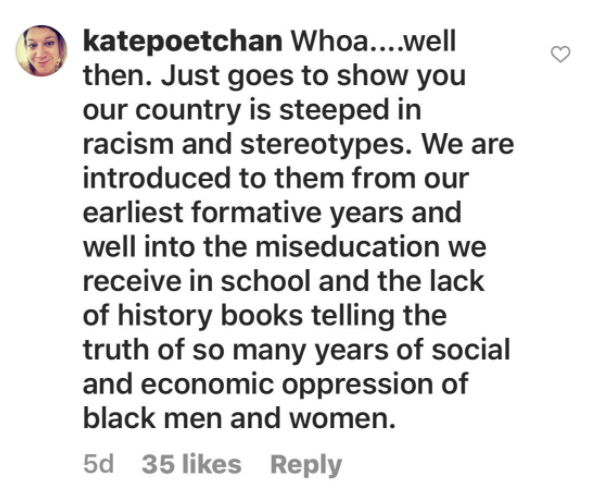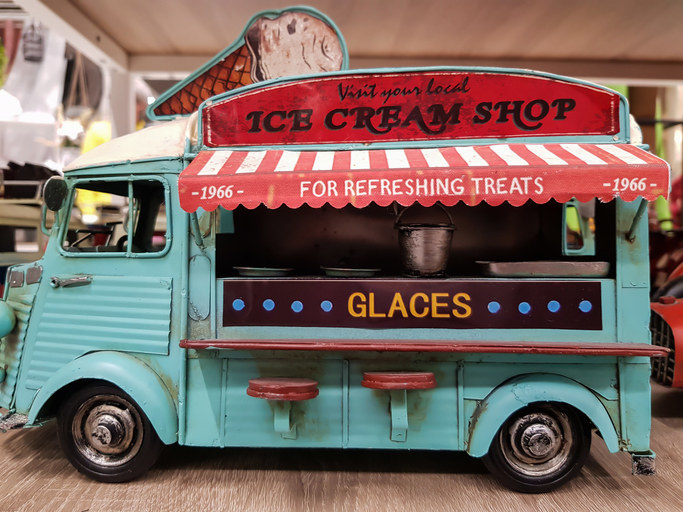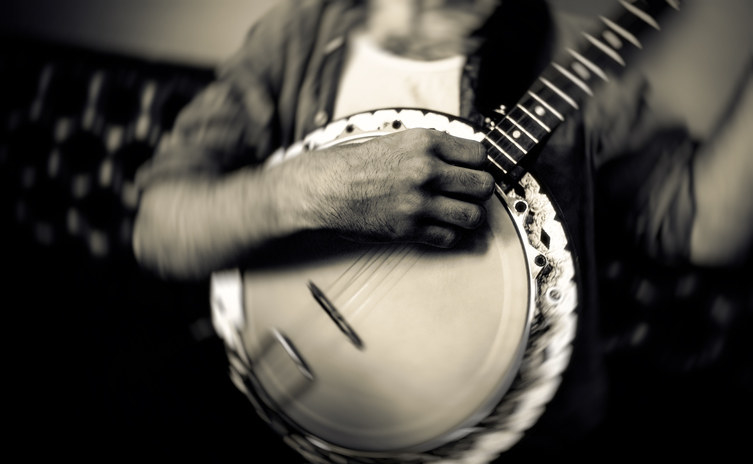Please note: This article discusses language and depictions of extreme racism.
I think it's safe to say that most people know the ice cream truck is coming when they hear this tune:
View this video on YouTube
However, a woman named Vanessa Blackwell recently learned about the song's racist origin online. "I was researching for one of the many series I have done on TikTok, and there was a link to a video that was exploring racism in tunes we all grew up singing and ones that most kids still sing today," Vanessa said. "I started scanning scholarly sites and articles and was in awe that there is ample information on the origins of these songs."

So Vanessa decided to make a TikTok sharing the information she learned about racism and the popular ice cream truck tune. Her video gained over half a million views and was even reshared by celebrities like Viola Davis:
After Viola shared Vanessa's video on her Instagram, many people — including other celebs — came forward to say they didn't know about the song's origins. "After seeing that Viola Davis shared it, my first thought was, As she should, the people need to know. Then — within 30 seconds — I realized how many people had to have seen it in order for it to get to her. Soon after, I realized how many more people would know because she shared it. Lenny Kravitz, Serena Williams, Michelle Pfeiffer, T-Boz...crazy. Am I surprised by how many people didn’t know? Absolutely not, even in the slightest," said Vanessa.

"I’m a big believer in having information. I hear too many times that racism isn’t everywhere in this country, and truthfully, I was just pointing out that even something as innocent as the ice cream song is rooted in racism. It’s an insult to every single African American and Black individual who is informed, educated, and savvy on their history in this country each time they hear it. And it’s played everywhere, all the time, on repeat in neighborhoods across this nation as a reminder. And that’s just one very specific example. There are endless examples of such," Vanessa explained.

The well-known ice cream truck tune dates back to a song titled "N**ger Love a Watermelon Ha! Ha! Ha!" that was released in March 1916 by Columbia Records. It was written by actor Harry C. Browne, who used the melody from the early-19th-century song "Turkey in the Straw."
View this video on YouTube
And the lyrics are hard to stomach. In the song, Browne says, "You n**gers quit throwin' them bones and come down and get your ice cream!" Black people are then heard responding, "Ice cream?" To which Browne replies, "Yes, ice cream! Colored man's ice cream: WATERMELON!"
View this video on YouTube
Some people may argue that the famous "ice cream truck song" is simply the "Turkey in the Straw" tune, but it's important to note how the melody first reached America. In an article for NPR, Theodore R. Johnson III stated that "Turkey in the Straw" was brought to the US colonies by Scotch-Irish immigrants who changed the lyrics to match their new lifestyle. However, the melody of the song was quickly appropriated by traveling blackface minstrel shows, meaning — for several decades — it was used to mock and make money off of Black people. Therefore, the song is deeply rooted in racism.
View this video on YouTube
In the 1800s, the music was associated with “Zip Coon” — a Blackface character played by George Washington Dixon who parodied a free Black man attempting to conform to white society.
During the 19th century, ice cream parlors were known for playing popular minstrel songs. Then, when ice cream trucks were introduced in the 1920s, they carried over the tradition of playing popular minstrel music to announce that they were in the neighborhood, which is how the tune from Browne's song came to be associated with ice cream trucks.

BuzzFeed spoke to Johnson, who said he first came across the ice cream truck song when he was researching Jim Crow stereotypes and the memorabilia that accompanied them. "That led me down a rabbit hole of blackface performances, which led to the genre known as 'coon songs.' That's where I first encountered the racist watermelon version of 'Turkey in the Straw.'"
View this video on YouTube
He added: "I wrote the article because I had no idea of the history of the song used by the ice cream truck, nor of all the other popular songs that had roots in blackface minstrel music. I thought that bit of Americana was interesting and also complicated, how one thing with such fond memories associated with it could be associated with an unflattering history."
Johnson also clarified that, while the ice cream truck song may be rooted in racism, the tune itself is not racist. "A melody can't be racist. However, melodies can be used for racist activities, like blackface or when paired with racist lyrics. The ice cream truck is playing a tune that dates back to Ireland, not the racist watermelon song. Racism commandeered a melody, just as it has with scores of things, like lunch counters, buses, flags, etc.," he explained.
BuzzFeed also spoke to Robert Fink, who is the academic associate dean and a professor of musicology at the UCLA Herb Alpert School of Music. "If you trace back the melody of the ice cream truck tune, it turns out to be rooted in this turn-of-the-century song with one of the most extreme versions of what's called a 'coon song' with these horrible, horrible stereotype lyrics," he explained.

Fink said the mistake would be to think that the origins of the ice cream truck song are unusual. "Basically, most of the old-time folk, banjo, and fiddle song lyrics have the n-word in them. And when we think of these songs, the question becomes, If you take racist lyrics away, have you taken the racism away? Obviously, you've done one step by removing and replacing the offensive word, but does that really solve anything? With the ice cream song, there are no words at all, so that's a very tricky thing. If you change the name or lyrics of a song, does something about the music itself that goes along with the previous lyrics need to be accounted for? Probably, yes, at some level," he said.

"I remember shocking my undergraduates in a fairly good way in my History of Popular Music class. All I had to do was play the first animated cartoon, Steamboat Willie. It has 'Turkey in the Straw' in it, which we know is a minstrel-type tune, and suddenly you look at Mickey Mouse and think, Oh my god..., that guy is in blackface. That got through to my students in a way that other things did not," Fink continued.
View this video on YouTube
Fink added, "Basically Disney, every single sweet memory we've ever had in our entire lives — the theme parks, all of that stuff — is built on mainstreaming the equivalent of 'Run, Johnny, Run,' where 'Johnny' is a two-syllable word substituting [for] the n-word. The question of what to do about it is a really difficult and profound one for music historians and any kind of art critic. But if history is a science, the objective truth is that this stuff is pervasive. Given the history of popular music in the United States, there's no morally unproblematic experience of music. There's no way to be right in this situation. I'm not saying erase Mickey Mouse, but just know where he came from. Be aware."
Some companies have already shared that they've changed the tune their ice cream trucks play after learning the song's origins. But Fink said that if you were to try to scrub our culture clean of everything that is this problematic, we would probably have nothing left. "We can accept that there's this tradition that we deeply love but that it also has these flaws in it. Just like people. You can love somebody and still know they're flawed. You can be deeply involved with someone, then find out that they have scary, bad things in their past," he said.
In January we added an Ice Cream Truck to our game that played the classic US ice cream jingle. A Black parent emailed to politely inform us that this famous jingle was incredibly racist. Mortified, we updated the jingle to an original composition ASAP https://t.co/5OxmP9Z9pJ






![Fink added, "Basically Disney, every single sweet memory we've ever had in our entire lives — the theme parks, all of that stuff — is built on mainstreaming the equivalent of 'Run, Johnny, Run,' where 'Johnny' is a two-syllable word substituting [for] the n-word. The question of what to do about it is a really difficult and profound one for music historians and any kind of art critic. But if history is a science, the objective truth is that this stuff is pervasive. Given the history of popular music in the United States, there's no morally unproblematic experience of music. There's no way to be right in this situation. I'm not saying erase Mickey Mouse, but just know where he came from. Be aware."](https://img.youtube.com/vi/BBgghnQF6E4/mqdefault.jpg)